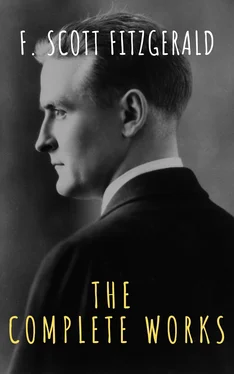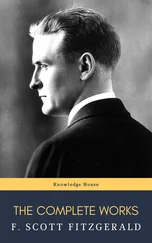Array The griffin classics - The Complete Works of F. Scott Fitzgerald
Здесь есть возможность читать онлайн «Array The griffin classics - The Complete Works of F. Scott Fitzgerald» — ознакомительный отрывок электронной книги совершенно бесплатно, а после прочтения отрывка купить полную версию. В некоторых случаях можно слушать аудио, скачать через торрент в формате fb2 и присутствует краткое содержание. Жанр: unrecognised, на английском языке. Описание произведения, (предисловие) а так же отзывы посетителей доступны на портале библиотеки ЛибКат.
- Название:The Complete Works of F. Scott Fitzgerald
- Автор:
- Жанр:
- Год:неизвестен
- ISBN:нет данных
- Рейтинг книги:5 / 5. Голосов: 1
-
Избранное:Добавить в избранное
- Отзывы:
-
Ваша оценка:
- 100
- 1
- 2
- 3
- 4
- 5
The Complete Works of F. Scott Fitzgerald: краткое содержание, описание и аннотация
Предлагаем к чтению аннотацию, описание, краткое содержание или предисловие (зависит от того, что написал сам автор книги «The Complete Works of F. Scott Fitzgerald»). Если вы не нашли необходимую информацию о книге — напишите в комментариях, мы постараемся отыскать её.
The first table of contents (at the very beginning of the ebook) lists the titles of all novels included in this volume. By clicking on one of those titles you will be redirected to the beginning of that work, where you'll find a new TOC that lists all the chapters and sub-chapters of that specific work.
The Complete Works of F. Scott Fitzgerald — читать онлайн ознакомительный отрывок
Ниже представлен текст книги, разбитый по страницам. Система сохранения места последней прочитанной страницы, позволяет с удобством читать онлайн бесплатно книгу «The Complete Works of F. Scott Fitzgerald», без необходимости каждый раз заново искать на чём Вы остановились. Поставьте закладку, и сможете в любой момент перейти на страницу, на которой закончили чтение.
Интервал:
Закладка:
“What have I had out of life?” John Jackson shook his head from side to side with quiet, tired despair. “Nothing!”
He picked up the second letter, the civic-welfare letter, and read it over; and then helpless, dazed laughter shook him physically until he trembled in his chair. On Wednesday, at the hour when his delinquent boy would arrive at the motherless home, John Jackson would be standing on a platform downtown, delivering one hundred resounding platitudes of inspiration and cheer. “Members of the association”—their faces, eager, optimistic, impressed, would look up at him like hollow moons—“I have been requested to try to tell you in a few words what I have had from life——”
Many people would be there to hear, for the clever young secretary had hit upon a topic with the personal note—what John Jackson, successful, able and popular, had found for himself in the tumultuous grab bag. They would listen with wistful attention, hoping that he would disclose some secret formula that would make their lives as popular and successful and happy as his own. They believed in rules; all the young men in the city believed in hard-and-fast rules, and many of them clipped coupons and sent away for little booklets that promised them the riches and good fortune they desired.
“Members of the association, to begin with, let me say that there is so much in life that if we don’t find it, it is not the fault of life, but of ourselves.”
The ring of the stale, dull words mingled with the patter of the rain went on and on endlessly, but John Jackson knew that he would never make that speech, or any speeches ever again. He had dreamed his last dream too long, but he was awake at last.
“I shall not go on flattering a world that I have found unkind,” he whispered to the rain. “Instead, I shall go out of this house and out of this town and somewhere find again the happiness that I possessed when I was young.”
Nodding his head, he tore both letters into small fragments and dropped them on the table beside him. For half an hour longer he sat there, rocking a little and smoking his cigar slowly and blowing the blue smoke out into the rain.
II
Down at his office, his chief clerk, Mr. Fowler, approached him with his morning smile.
“Looking fine, Mr. Jackson. Nice day if it hadn’t rained.”
“Yeah,” agreed John Jackson cheerfully. “Clear up in an hour. Anybody outside?”
“A lady named Mrs. Ralston.”
Mr. Fowler raised his grizzled eyebrows in facetious mournfulness.
“Tell her I can’t see her,” said John Jackson, rather to his clerk’s surprise. “And let me have a pencil memorandum of the money I’ve given away through her these twenty years.”
“Why—yes, sir.”
Mr. Fowler had always urged John Jackson to look more closely into his promiscuous charities; but now, after these two decades, it rather alarmed him.
When the list arrived—its preparation took an hour of burrowing through old ledgers and check stubs—John Jackson studied it for a long time in silence.
“That woman’s got more money than you have,” grumbled Fowler at his elbow. “Every time she comes in she’s wearing a new hat. I bet she never hands out a cent herself—just goes around asking other people.”
John Jackson did not answer. He was thinking that Mrs. Ralston had been one of the first women in town to bar Ellery Jackson from her house. She did quite right, of course; and yet perhaps back there when Ellery was sixteen, if he had cared for some nice girl——
“Thomas J. MacDowell’s outside. Do you want to see him? I said I didn’t think you were in, because on second thoughts, Mr. Jackson, you look tired this morning——”
“I’ll see him,” interrupted John Jackson.
He watched Fowler’s retreating figure with an unfamiliar expression in his eyes. All that cordial diffuseness of Fowler’s—he wondered what it covered in the man’s heart. Several times, without Fowler’s knowledge, Jackson had seen him giving imitations of the boss for the benefit of the other employees; imitations with a touch of malice in them that John Jackson had smiled at then, but that now crept insinuatingly into his mind.
“Doubtless he considers me a good deal of a fool,” murmured John Jackson thoughtfully, “because I’ve kept him long after his usefulness was over. It’s a way men have, I suppose, to despise anyone they can impose on.”
Thomas J. MacDowell, a big barn door of a man with huge white hands, came boisterously into the office. If John Jackson had gone in for enemies he must have started with Tom MacDowell. For twenty years they had fought over every question of municipal affairs, and back in 1908 they had once stood facing each other with clenched hands on a public platform, because Jackson had said in print what everyone knew—that MacDowell was the worst political influence that the town had ever known. That was forgotten now; all that was remembered of it went into a peculiar flash of the eye that passed between them when they met.
“Hello, Mr. Jackson,” said MacDowell with full, elaborate cordiality. “We need your help and we need your money.”
“How so?”
“Tomorrow morning, in the ‘Eagle,’ you’ll see the plan for the new Union Station. The only thing that’ll stand in the way is the question of location. We want your land.”
“My land?”
“The railroad wants to build on the twenty acres just this side of the river, where your warehouse stands. If you’ll let them have it cheap we get our station; if not, we can just whistle into the air.”
Jackson nodded.
“I see.”
“What price?” asked MacDowell mildly.
“No price.”
His visitor’s mouth dropped open in surprise.
“That from you?” he demanded.
John Jackson got to his feet.
“I’ve decided not to be the local goat anymore,” he announced steadily. “You threw out the only fair, decent plan because it interfered with some private reservations of your own. And now that there’s a snag, you’d like the punishment to fall on me. I tear down my warehouse and hand over some of the best property in the city for a song because you made a little ‘mistake’ last year!”
“But last year’s over now,” protested MacDowell. “Whatever happened then doesn’t change the situation now. The city needs the station, and so”—there was a faint touch of irony in his voice—“and so naturally I come to its leading citizen, counting on his well-known public spirit.”
“Go out of my office, MacDowell,” said John Jackson suddenly. “I’m tired.”
MacDowell scrutinized him severely.
“What’s come over you today?”
Jackson closed his eyes.
“I don’t want to argue,” he said after awhile.
MacDowell slapped his fat upper leg and got to his feet.
“This is a funny attitude from you,” he remarked. “You better think it over.”
“Good-bye.”
Perceiving, to his astonishment, that John Jackson meant what he said, MacDowell took his monstrous body to the door.
“Well, well,” he said, turning and shaking his finger at Jackson as if he were a bad boy, “who’d have thought it from you after all?”
When he had gone Jackson rang again for his clerk.
“I’m going away,” he remarked casually. “I may be gone for some time—perhaps a week, perhaps longer. I want you to cancel every engagement I have and pay off my servants at home and close up my house.”
Mr. Fowler could hardly believe his ears.
“Close up your house?”
Jackson nodded.
“But why—why is it?” demanded Fowler in amazement.
Jackson looked out the high window upon the grey little city drenched now by slanting, slapping rain—his city, he had felt sometimes, in those rare moments when life had lent him time to be happy. That flash of green trees running up the main boulevard—he had made that possible, and Children’s Park, and the white dripping buildings around Courthouse Square over the way.
Читать дальшеИнтервал:
Закладка:
Похожие книги на «The Complete Works of F. Scott Fitzgerald»
Представляем Вашему вниманию похожие книги на «The Complete Works of F. Scott Fitzgerald» списком для выбора. Мы отобрали схожую по названию и смыслу литературу в надежде предоставить читателям больше вариантов отыскать новые, интересные, ещё непрочитанные произведения.
Обсуждение, отзывы о книге «The Complete Works of F. Scott Fitzgerald» и просто собственные мнения читателей. Оставьте ваши комментарии, напишите, что Вы думаете о произведении, его смысле или главных героях. Укажите что конкретно понравилось, а что нет, и почему Вы так считаете.












